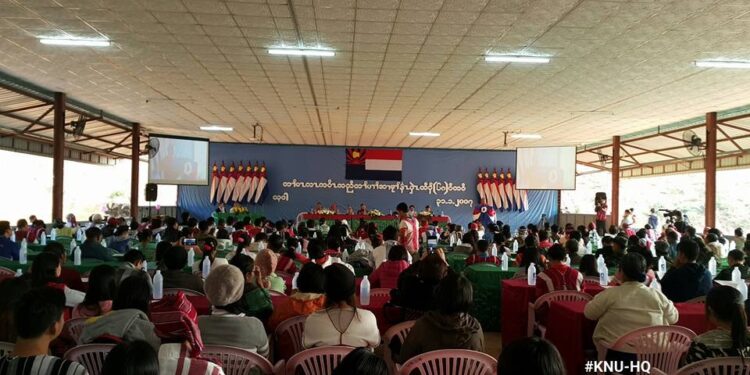The ethnic Karen armed resistance movement commemorated 68 years of struggle on Tuesday. On the occasion, Saw Mutu Say Poe, chairman of the Karen National Union (KNU), called for all Karen people to participate in the cause, stating that the goal of the resistance had yet to be achieved.
“At the present time, the political aims and objectives of the Karen people have not been completed yet. They still have not gotten their legitimate rights,” said Saw Mutu Say Poe in his speech on Karen Revolutionary Resistance Day.
“We must work on, confidently and with firm determination, until our Karen people’s aims, aspirations and needs are achieved. At the same time, in performing future work, we must always maintain revolutionary alertness,” he added.
Ceremonies of the Karen Resistance Day are traditionally observed in the KNU’s headquarters, Law Khee Lar, and in KNU’s Brigade 5 area in Papun District as well as in other KNU territories and areas home to large Karen communities. The occasion is celebrated every year on Jan. 31.
The Karen armed resistance was officially recognized in 1949 when the Karen National Liberation Army (KNLA), the military wing of KNU, was founded. Yet its structures existed earlier, when the Karen fought alongside British troops during World War II in Burma, and conducting underground activities.
After almost 70 years of armed struggle, the KNU now is trying to adapt to the dynamic political environment unfolding in Burma, where the majority of its leaders are engaged closely with the Burma Army in the peace process.
Saw Mutu Say Poe said that resolving political problems through political means remains the best and most appropriate way to address the country’s conflict. He also said that the recently held Karen National Political Conference in Hpa-an, the capital of Karen State, has “served as an illustration of Karen national unity and it has further strengthened the Karen national political aspirations.”
He said that the time was right for the Karen people to discuss the KNU’s political aims, which are national equality, self-determination and the establishment of a democratic federal Union.
“The aim of the KNU and the Karen people is the establishment of a federal system based on freedom, equality and justice,” said Saw Mutu Say Poe.
He also urged all Karen people to work for education, health, land ownership and other rights with unity in the wake of the recently held political dialogue.
“For the fulfilment of the Karen people’s political aims, objectives and aspirations, all Karen nationals must work in the respective arena they are in, according to the skill, wisdom and strength they possess,” said Saw Mutu Say Poe.
The KNU chairman also said that he would respect and honor all those Karen leaders and soldiers who have sacrificed for the resistance, adding that the organization inevitably had to take up armed struggle as a form of self-defense, as their demands and rights were denied by successive governments.
Yet there have been many setbacks in the history of the Karen armed struggle, including divisions, factional battles and assassinations.
Karen political bodies such as the Karen Central Organization (KCO) and its youth branch, the Karen Youth Organization (KYO), emerged in 1945 to contest Burma’s general elections in 1947, the year the KNU was founded and in which Burma earned its independence from Britain.
Disagreements over who should represent Karen interests in Parliament, however, led to the resignation of several KNU and KCO leaders.
Since the beginning of its armed struggle, the KNU has suffered great losses of territory in Insein, Rangoon Division; Taungoo, Pegu Division; Papun in northern Karen State; and Manerplaw on the Thai-Burma border.
In 1995, the Democratic Karen Buddhist Army (DKBA) split from the KNU, resentful that Buddhist Karens had not been allocated more senior positions in the organization’s leadership. The resulting battle between the two forces led to massive losses on both sides, while the Burmese military made huge territorial gains.
In 2007, more bloodshed unfolded as a result of Karen disunity: a breakaway group calling itself the KNU/KNLA Peace Council split from the KNU, leading to assassinations on both sides, including the killing of the late KNU general secretary Padoh Mahn Sha in 2008.
KNU leaders are once again facing internal problems. The KNU Central Executive Committee is currently divided between those who want to move more quickly with the peace process and those who are urging caution.
Saw Mutu Say Poe said, “There have been some colleagues who have become worn-out, lost faith in the victory of the revolution and parted ways from cooperation.”
He said that he remains optimistic about the political dialogue being carried out under the peacemaking initiatives.
He said, “Our revolutionary resistance still stand firm, because our national leaders, armed forces members and patriots are standing unwaveringly for our revolutionary resistance.”

















